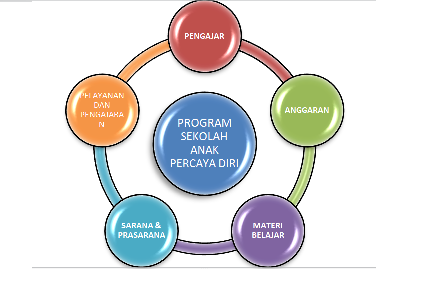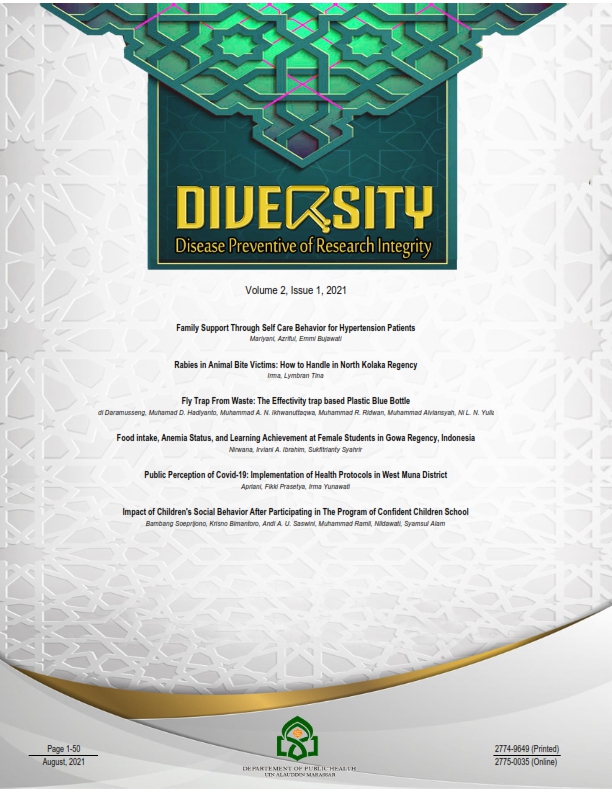Impact of Children's Social Behavior After Participating in The Program of Confident Children School
Abstract
One of the important aspects needed for early childhood is the aspect of self-confidence. Self-confidence is an attitude that will build him to interact in community life, the family environment and the school environment. This study is designed to evaluate the effectiveness of the Confidence Children's School as part of the CSR program of PT Pertamina Regional VII, South Sulawesi. This report presents an analysis of post-programme data collected from 30 children and 1 facilitator and 6 parents whose children attended the School for Confidence Children program. The data are then presented descriptively using the Likert scale and qualitatively to assess the effectiveness of this program. The results showed that 3 variables that support the Self-Confidence Children's School program, namely the content or material of the program, service during learning and the ability of the teaching staff to produce very good grades with criteria at the very satisfied level. In addition, the knowledge, actions and attitudes of students after participating in the school program are confident that each child has criteria for being at a good level. The Confident Children's School Program has immediate value for participating children and families as participants are equipped with skills to reduce emotional and behavioral difficulties.

Downloads
References
Aji, W., Nashori, F., & Sulistyarini, I. (2013). Pengaruh pelatihan kebersyukuran terhadap penerimaan orang tua pada anak retardasi mental. Jurnal Psikologi Integratif, 1(1), 97-104. http://202.0.92.5/isoshum/PI/article/view/1429
Ardington, C., Wills, G., & Kotze, J. (2021). COVID-19 learning losses: early grade reading in South Africa. International Journal of Educational Development, 102480. https://doi.org/10.1016/j.ijedudev.2021.102480
Biddle, S. J., Ciaccioni, S., Thomas, G., & Vergeer, I. (2019). Physical activity and mental health in children and adolescents: An updated review of reviews and an analysis of causality. Psychology of Sport and Exercise, 42, 146-155. https://doi.org/10.1016/j.psychsport.2018.08.011
Bierman, K. L., & Motamedi, M. (2015). Social and emotional learning programs for preschool children. Handbook of social and emotional learning: Research and practice, 135-151. https://sites.psu.edu/redi/wp-content/uploads/sites/29653/2015/08/bierman-preschool-in-press.pdf
Bustan, R., Nurfadilah, N., & Fitria, N. (2017). Pelatihan Optimalisai Tumbuh Kembang Anak pada Orangtua Anak Usia Dini. Jurnal Al-Azhar Indonesia Seri Humaniora, 3(3), 274-282. http://dx.doi.org/10.36722/sh.v3i3.214
Courtney, D., Watson, P., Battaglia, M., Mulsant, B. H., & Szatmari, P. (2020). COVID-19 impacts on child and youth anxiety and depression: challenges and opportunities. The Canadian Journal of Psychiatry, 65(10), 688-691. https://doi.org/10.1177%2F0706743720935646
Dooley, J. J., Shaw, T., & Cross, D. (2012). The association between the mental health and behavioural problems of students and their reactions to cyber-victimization. European Journal of Developmental Psychology, 9(2), 275-289. https://doi.org/10.1080/17405629.2011.648425
Espelage, D. L., Polanin, J. R., & Low, S. K. (2014). Teacher and staff perceptions of school environment as predictors of student aggression, victimization, and willingness to intervene in bullying situations. School Psychology Quarterly, 29(3), 287-305. https://doi.org/10.1037/spq0000072
Fazel, M., Reed, R. V., Panter-Brick, C., & Stein, A. (2012). Mental health of displaced and refugee children resettled in high-income countries: risk and protective factors. The Lancet, 379(9812), 266-282. https://doi.org/10.1016/S0140-6736(11)60051-2
Jakobsen, T. B. (2013). Anti-social youth? Disruptions in care and the role of ‘behavioral problems’. Children and Youth Services Review, 35(9), 1455-1462. https://doi.org/10.1016/j.childyouth.2013.05.012
Lawrence, D., Hafekost, J., Johnson, S. E., Saw, S., Buckingham, W. J., Sawyer, M. G., & Zubrick, S. R. (2016). Key findings from the second Australian child and adolescent survey of mental health and wellbeing. Australian & New Zealand Journal of Psychiatry, 50(9), 876-886. https://doi.org/10.1177%2F0004867415617836
Marcen, C., Gimeno, F., Gómez, C., Sáenz, A., & Gutiérreza, H. (2013). Socioeconomic status, parental support, motivation and self-confidence in youth competitive sport. Procedia-Social and Behavioral Sciences, 82, 750-754. https://doi.org/10.1016/j.sbspro.2013.06.342
Mubarok, P. P. (2016). Program pengasuhan positif untuk meningkatkan keterampilan mindful parenting orangtua remaja. Psympathic: Jurnal Ilmiah Psikologi, 3(1), 35-50. https://doi.org/10.15575/psy.v3i1.1095
Nix, R. L., Bierman, K. L., Domitrovich, C. E., & Gill, S. (2013). Promoting children's social-emotional skills in preschool can enhance academic and behavioral functioning in kindergarten: Findings from Head Start REDI. Early Education & Development, 24(7), 1000-1019. https://doi.org/10.1080/10409289.2013.825565
Pedrelli, P., Nyer, M., Yeung, A., Zulauf, C., & Wilens, T. (2015). College students: mental health problems and treatment considerations. Academic Psychiatry, 39(5), 503-511. https://doi.org/10.1007/s40596-014-0205-9
Racine, N., Cooke, J. E., Eirich, R., Korczak, D. J., McArthur, B., & Madigan, S. (2020). Child and adolescent mental illness during COVID-19: A rapid review. Psychiatry research, 292, 113307. https://dx.doi.org/10.1016%2Fj.psychres.2020.113307
Segrin, C., Givertz, M., Swaitkowski, P., & Montgomery, N. (2015). Overparenting is associated with child problems and a critical family environment. Journal of Child and family Studies, 24(2), 470-479. https://doi.org/10.1007/s10826-013-9858-3
Thomas, R., Abell, B., Webb, H. J., Avdagic, E., & Zimmer-Gembeck, M. J. (2017). Parent-child interaction therapy: a meta-analysis. Pediatrics, 140(3). https://doi.org/10.1542/peds.2017-0352
Webster-Stratton, C. (2003). Stress: A potential disruptor of parent perceptions and family interactions. Journal of clinical child psychology, 19(4), 302-312. https://doi.org/10.1207/s15374424jccp1904_2
Wren, F. J., Scholle, S. H., Heo, J., & Comer, D. M. (2003). Pediatric mood and anxiety syndromes in primary care: who gets identified?. The International Journal of Psychiatry in Medicine, 33(1), 1-16. https://doi.org/10.2190%2FUT6D-RDFG-LBT7-G39N
Copyright (c) 2021 Author(s)

This work is licensed under a Creative Commons Attribution-NonCommercial-ShareAlike 4.0 International License.
Authors retain copyright and grant the journal right of first publication with the work simultaneously licensed under a Creative Commons Attribution-NonCommercial-ShareAlike 4.0 International License that allows others to share the work with an acknowledgment of the work's authorship and initial publication in this journal.
Authors are able to enter into separate, additional contractual arrangements for the non-exclusive distribution of the journal's published version of the work (e.g., post it to an institutional repository or publish it in a book), with an acknowledgment of its initial publication in this journal.
Authors are permitted to publish their work online in third parties as it can lead to wider dissemination of the work.




